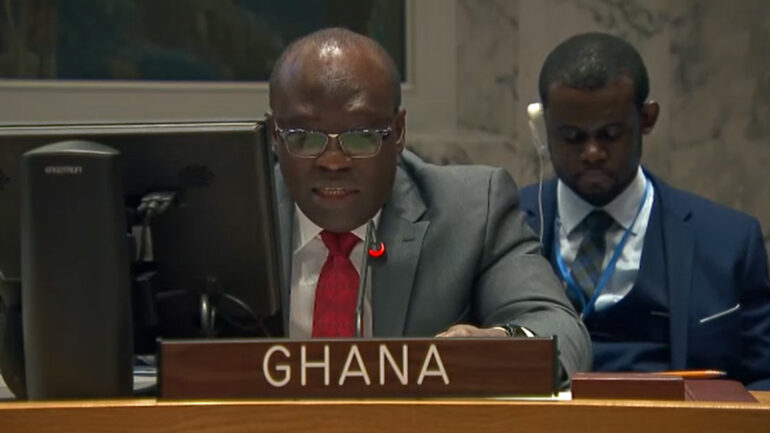Cooperation between the UN and regional and sub regional organizations (African Union)

Mr. President, Your Excellency Michael Moussa-Adamo, Foreign Minister of Gabon, Let me begin by thanking you for your continuing leadership of this Council during the Presidency of Gabon. I also welcome the statements of Secretary-General Antonio Guterres and Chairperson Moussa Faki-Mahamat on this important annual debate on cooperation between the United Nations and the African Union.
Mr. President,
The strengthening of the links of cooperation between the United Nations and the African Union is a necessity required to sustain peace and security on the continent, but also to address the multifaceted dimensions of the socio-economic and other challenges which negatively impact Africa. In our determination to reverse the roll back of democracy in five countries on the continent, to silence the guns in Africa and develop the resilience of many societies that are strained by climate change and other fragile contexts, there is a clarity in our minds that while the African Union should take a leadership role on the basis of its normative frameworks for peace and security, as well as governance, the United Nations responsibility and support should not be curtailed and would continue to be critical. We therefore underscore Chapter VIII of the Charter and the need to deepen the cooperation and partnership between the Security Council and the AUPSC, across the peace continuum: ranging from conflict prevention and peacekeeping to peacebuilding and sustaining peace, as well as addressing the request for sustainable financing of AU-led peace support operations.
Mr. President,
To enhance the cooperation between the UN and AU in furtherance of durable peace and security on the continent, we would want to highlight a few additional points.
Firstly, we emphasise the need for consultations between the UN and the AU to be deepened and to proactively focus on the reinforcement of capacity for homegrown solutions in dealing with the complex security challenges on the continent. In this regard, we urge that such consultations should, for instance, include support arrangements for the 2021-2025 Workplan on the enhancement of the African Standby Force, which is soon due for submission to the African Union Specialized Technical Committee on Defence, Safety and Security.
Secondly, we encourage the further implementation of joint missions’ briefings and assessments on issues of peace and security on the continent, including for the ongoing Joint Independent Assessment of Security and Development in the Sahel led by former President Issoufou of Niger. We are optimistic that the Panel’s mandate would emerge with a more sustainable approach in addressing the multidimensional crises in the region and the continent at large. We encourage the extension of such joint approaches to the assessment of the performance of a number of the peacekeeping missions on the continent which are yet to fully deliver on their expected objectives and mandates while also resolving the concerns over predictability, sustainability, and flexibility of financing for African Union-led peace support operations.
Thirdly, in the light of the increasing incidents of terrorist attacks in many parts of the continent we cannot approach our collective response to such threats in a business-as-usual manner. As the AU proceeds with its implementation of the 28th May Malabo Declaration, it is important that the United Nations be a partner in that process. In that regard, it would be important that in addressing terrorism and the governance challenges on the continent, the UN-AU cooperation address the root causes of instability on the continent while also addressing the impact of climate change, the COVID-19 pandemic, and other aggravating geopolitical situations. The role of women and the youth should be elevated for sustaining peace and development.
Fourthly, it is important for the cooperation between the two bodies to continue to harness the rich experiences built over the years in the area of preventive diplomacy and mediation. As we have consistently held, prevention is always better than curing and early support for regional preventative measures would go a long way in maintaining international peace and security and in realizing the 2030 AU initiative to Silence the Guns.
In concluding Mr. President, Ghana believes that there is no better way to address the myriad of security and development challenges in Africa than through the enhancement of homegrown interventions, coupled with deeper cooperation between the UN, AU and other inter- regional arrangements. The political will and commitment of Member States including this Council would continue to be essential in sustaining peace in Africa. We have also heard the renewal of support for permanent representation of Africa in a reformed Security Council. The time to move past the words into action is now.
I thank you!
